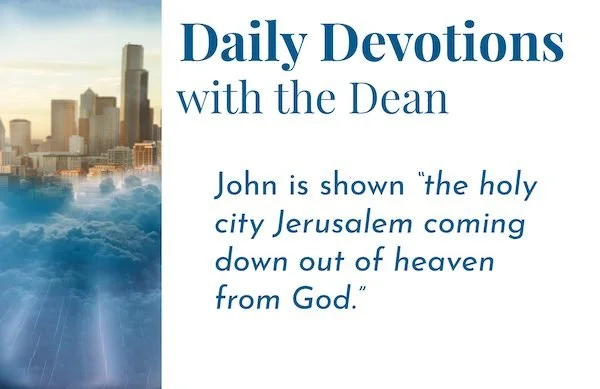Wednesday • 11/22/2023 •
Wednesday of the Twenty-fifth Week After Pentecost (Proper 28)
This morning’s Scriptures are: Psalm 101; Psalm 109; 1 Maccabees 3:42–60; Revelation 21:9–21; Matthew 17:22–27
Further thoughts on Revelation 21:9–21 from 11/23/2020 at https://tinyurl.com/e4xt5xzy
This morning’s Canticles are: following the OT reading, Canticle 11 (“The Third Song of Isaiah,” Isaiah 60:1-3,11a,14c,18-19, BCP, p. 87); following the Epistle reading, Canticle 16 (“The Song of Zechariah,” Luke 1:68-79, BCP, p. 92)
Welcome to Daily Office Devotions, where every Monday through Friday we ask how God might direct our lives from that day’s Scripture readings, as given in the Book of Common Prayer. I’m Reggie Kidd, and I’m grateful to be with you. This Wednesday in the Season After Pentecost our readings come from Proper 28 of Year 1 in the Daily Office Lectionary.
The juxtaposition of 1 Maccabees and Revelation. In 1 Maccabees, Judas Maccabeus piously and passionately prepares to preserve and purify Jerusalem and its sanctuary. Throughout the waxing and waning of Israel’s fortunes, its people see themselves as stewards of a sacred treasure. In Revelation, John is shown, by contrast, a heavenly Jerusalem, “the holy city Jerusalem coming down out of heaven from God” (Revelation 21:10b). From the perspective of the early leaders of the Christian church, the earthly Jerusalem and the physical temple (built by Solomon, rebuilt by Ezra-Nehemiah, reclaimed by Judas Maccabeus, and expanded by Herod the Great) are “shadows” that must eventually give way to “reality.” That reality is the heavenly Jerusalem, “the bride, the wife of the Lamb” (Revelation 21:10a).
The perspective that God would have John communicate to us is that through all the tribulation, the strife, and the turmoil in the church’s experience here “below,” there is being prepared for her a glorious ending. Indeed, as blemished as the church itself can be, God is working to beautify her and prepare her for her wedding day. We will eventually hear the Lord commending her for her “righteous deeds” (Revelation 19:8). As confused and as error-prone as the church’s own stewards seem to be, the Lord is building her according to his own design, out of valuable materials, with perfect symmetry, and at an unimaginably huge scale. That is the encouragement John receives in the vision of a city with gates named after the twelve tribes of Israel, and foundations named after the twelve apostles (Revelation 21:12–14). All are built with fantastic proportions and measurements (Revelation 21:15–17), and are constructed using precious stones for building materials (Revelation 21:18–21).
Matthew: Jesus and the temple tax. In his relationship with his lead disciple Simon Peter, Jesus shows how the Good Shepherd (John 10) cares for a shepherd-in-training.
What whiplash Simon Peter has been experiencing in our last couple of days of readings in Matthew! He is given the “keys to the Kingdom” for recognizing Jesus as Messiah; then he’s rebuked as a “Satan” for questioning Messiah’s plan to carry out his mission via death and resurrection. In the Transfiguration of the Lord Jesus, Peter is treated to a vision of the future of humankind’s glorification. His bumbling attempt to memorialize the experience gets unceremoniously shut down by a bright cloud of theophany (God’s presence).
Along with the other disciples, Peter is chided for not having enough faith to perform miracles. The next thing he and the disciples know, Jesus is talking again about the death and resurrection of the Son of Man. Understandably, “they became greatly distressed” (Matthew 17:23b).
With all this to sort out in his heart and his head, Peter gets accosted by the local “revenue service”: “Your teacher does pay the temple tax, doesn’t he?” (Matthew 17:24 my translation). In the law of Moses (Exodus 30:11–16), every male twenty years old and up was required to pay the tax “for the service of the tent of meeting; before the Lord it will be a reminder to the Israelites of the ransom given for your lives” (Exodus 30:16). Peter answers, “Yes.”
Rather than take us into the swirl of thoughts in Peter’s head, Matthew notes instead that before Peter can say a word in reporting the encounter, Jesus takes him aside for a private moment. Jesus reminds Peter of two simple truths:
Jesus still is Messiah. “From whom do kings of the earth take toll or tribute? From their children or from others?” When Peter said, “From others,” Jesus said to him, “Then the children are free” (Matthew 17:25b–26). Despite all the hard news about his upcoming sufferings, Jesus affirms that he is “greater than the temple” (Matthew 12:6). Peter’s faith in him as Son of God and Messiah is not in vain. Jesus assures Peter that he (Jesus) is, indeed, Son of God and, as the writer to the Hebrews is later to write, Lord over the house (Hebrews 3:6).
Meanwhile, things that are temporary and provisional are still worth taking care of. Though the Jerusalem temple is but a “shadow” destined to give way to “reality” when Jesus establishes a new temple made of “living stones” (1 Peter 2:5), he and Peter can give due honor to the earthly temple while it is still standing. “However, so that we do not give offense to them, go to the sea and cast a hook; take the first fish that comes up; and when you open its mouth, you will find a coin; take that and give it to them for you and me” (Matthew 17:27). Sometimes, because we know “the rest of the story,” we can make concessions to provisional, temporary, and even seemingly trivial constraints.
Be blessed this day,
Reggie Kidd+



